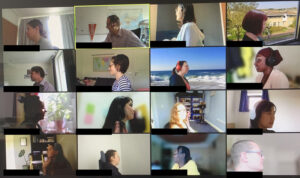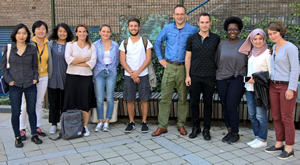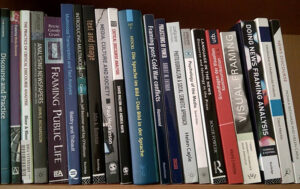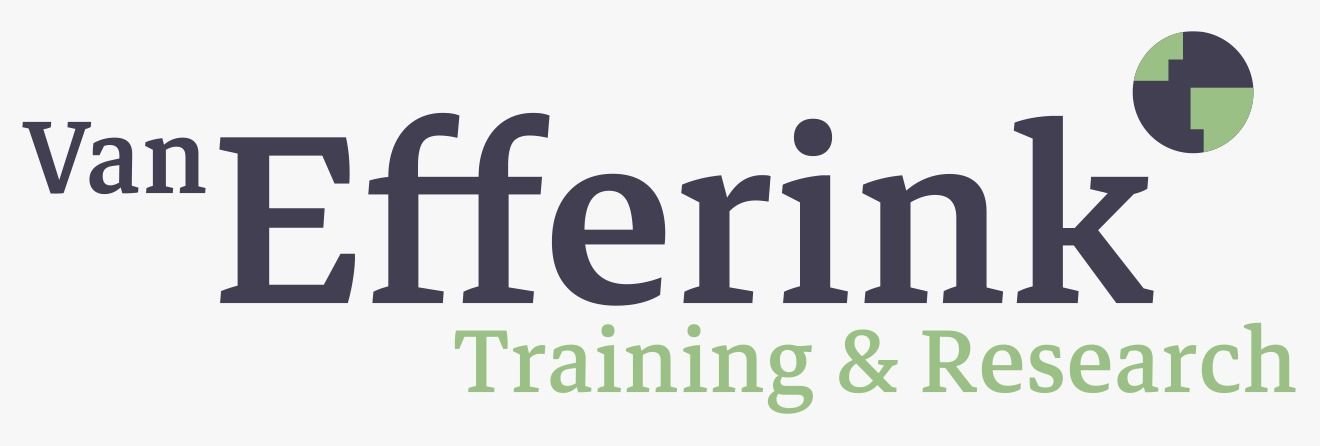
In the past four years, the new online edition of the Media Representations and Research Methods Summer School was fully booked. For me, it was a great pleasure each time to teach 15 motivated students from many countries around the world (from Ecuador in the “West” to New Zealand in the “East”).
In 2024, I organize this course again, once more in close collaboration with Maastricht Summer School. You can read more about the course content, course objectives and recommended literature below. This page also offers you the timetable of this Summer School.
The course at Maastricht Summer School course in a nutshell
- The course focuses on critical discourse analysis, social semiotics and news framing.
- The course teaches you to work with a hands-on template that helps you to write better academic papers.
- The course includes a one-hour lecture on research questions and offers personal advice on your research questions.
- The course includes all day e-mail support in case you get stuck with your assignment.
- The course will be online.
- The course is spread across two weeks.
- The course limits teaching hours to three hours daily.
- The course fee will be €499.
- Do you have questions about the program, content and recommended readings of this course? Please contact Leonhardt
- Would you like to apply for the course? Please visit the DreamApply website

Student reviews
“I found Leonhardt very well familiar with all the dynamics of his class room, as he very efficiently caters to the need of all his students coming from different social, cultural and educational backgrounds.” – Sadia from Pakistan
“Leonhardt is a great lecturer who knows his subject matter. I found his inclusive approach particularly useful in teaching media analysis techniques.” – Koen from Belgium
“Not only did Leonhardt demonstrate a high level of expertise in the subject, but he also helped his students understand difficult concepts in a very accessible way, effectively bridging the gap between theory and practice, and fostering fruitful discussions in class.” – Carolina from Brazil
Quotes taken from LinkedIn recommendations
Description of Media Representations and Research Methods Course
How do you make sense of the wide variety of perspectives in the media? For example, how can we interpret newspaper coverage of the War in Ukraine, tweets by Elon Musk, or Instagram posts on climate change, food, and migration? This course offers you academic yet practical answers to these questions. It teaches you the analytical skills to study the possible meanings of textual and visual media representations.
Interactive lectures raise your understanding of concepts and methods, helping you examine what combinations of words and/or visual elements could mean in terms of a broader debate in society. These lectures further teach you how national identities and power relations affect the interpretations of media representations. Your individual assignment concerns a short paper, in which you apply a method to study one or two news articles, short YouTube videos, or social media posts. You will write and present this paper during this two-week course.
Exclusively for this Summer School, Dr. Leonhardt van Efferink developed a template that helps you write a well-structured course paper. On top of this, he offers individual feedback in class and active personal tutoring by e-mail. Finally, his support includes a comprehensive framework to develop focused, consistent, and transparent research questions.
Goals of Media Representations and Research Methods Course
- Write a well-structured research paper in which you study media representations with textual and/or visual elements (e.g., newspaper/magazine articles with photos, cartoons, and Instagram/Twitter posts).
- Develop a research method that draws on critical discourse analysis, social semiotic analysis, and/or news framing analysis, in line with your research objectives.
- Formulate research questions that are clear, focused, and consistent, saving you a lot of time later in the research process.
- Compile a dataset for your thesis or dissertation that is manageable and relevant.
- Understand the complexity of text-image relations and their role in meaning-making processes.
- Explain the role of the national and ideological contexts in which (social) media content is being produced.
Timetable
| TIMETABLE FOR 19 – 30 AUGUST 2024 (ONLY ONLINE SESSIONS) | ||||
| All times refer to GMT+2/Amsterdam time zone | ||||
| Course Leader: Dr Leonhardt van Efferink; *1 = first week; *2 = second week; required minimum number of students: 11 | ||||
| Online Session Types: (IL)=Interactive Lectures; (RD)=Roundtable Discussions; (SP)= Student Presentations; (TS)=Tutorial Session | ||||
| Day | Start Time | End Time | Online Session | Type |
| Monday *1 | 13:00 | 15:00 | 1. Introduction of Convenor, Participants and Program | RD |
| Monday *1 | 15:00 | 16:00 | 2. Research Questions | IL |
| Tuesday *1 | 13:00 | 14:00 | 3. Media, Representations and Meanings | IL |
| Tuesday *1 | 14:00 | 15:00 | 4. From Signifier to Discourse | IL |
| Tuesday *1 | 15:00 | 16:00 | 5. Research Design, Your Positionality and Research Paper Template | IL |
| Wednesday *1 | – | – | (No sessions; Leonhardt offers e-mail support) | – |
| Thursday *1 | 13:00 | 14:00 | 6. Social Semiotics: The Fundamentals | IL |
| Thursday *1 | 14:00 | 15:00 | 7. Critical Discourse Analysis: The Fundamentals | IL |
| Thursday *1 | 15:00 | 16:00 | 8. News Framing Analysis: The Fundamentals | IL |
| Friday *1 | 13:00 | 14:00 | 9. Doing Social Semiotics: Combining Textual and Visual Perspectives | IL |
| Friday *1 | 14:00 | 15:00 | 10. Doing Critical Discourse Analysis: Questioning Powerful Perspectives | IL |
| Friday *1 | 15:00 | 16:00 | 11. Doing News Framing Analysis: Comparing Conflicting Perspectives | IL |
| Weekend | – | – | (No sessions; Leonhardt offers e-mail support) | – |
| Monday *2 | 13:00 | 14:00 | 12. Formulating Focused and Fundamental Findings | TS |
| Tuesday *2 | 13:00 | 14:00 | 13. Crafting Convincing and Credible Conclusions | TS |
| Wednesday *2 | – | – | (No sessions; deadline for your paper: 15.00) | – |
| Thursday *2 | 13:00 | 15:00 | 14. Your Research Findings (First Group) | SP |
| Friday *2 | 13:00 | 15:00 | 15. Your Research Findings (Second Group) | SP |
| Questions about Program, Content and Recommended Readings? Please contact Leonhardt | ||||
| Questions about Application Process? Please contact Maastricht Summer School Office | ||||

Suggested Literature
Dr Leonhardt van Efferink has based this course on publications in various languages (see overview below for some examples). You are not required to do pre-course reading. However, if you would like to do so, you are advised to select one of the publications below. You can also contact Leonhardt for tailor-made reading advice.
- Caple, H. (2013) Photojournalism. A Social Semiotic Approach.
- Dahinden, U. (2006). Framing. Eine integrative Theorie der Massenkommunikation.
- D’Angelo, P. (ed.) (2018) Doing News Framing Analysis II. Empirical and Theoretical Perspectives.
- Geise, S., & Lobinger, K. (eds.). (2013). Visual Framing. Perspektiven und Herausforderungen der visuellen Kommunikationsforschung.
- Machin, D. (2007) Introduction to Multimodal Analysis.
- Machin, D. and Mayr, A. (2012) How to do Critical Discourse Analysis.
- Richardson, J. (2007) Analysing Newspapers. An Approach from Critical Discourse Analysis.
- Royce, T. D. (2006). Intersemiotic Complementarity. A Framework for Multimodal Discourse Analysis. In T. D. Royce, & W. Bowcher (Eds.), New Directions in the Analysis of Multimodal Discourse (pp. 63-109).
- Van Gorp, B. (2010) Strategies to take the Subjectivity out of Framing Analysis. In P. D’Angelo, & J. A. Kuypers (Eds.), Doing News Framing Analysis. Empirical and Theoretical Perspectives (pp. 84-109).
- Wodak, R. and Meyer, M. (eds., 2016) Methods of Critical Discourse Studies.
Keywords
▪ Critical Discourse Analysis ▪ Social Semiotics ▪ News Framing ▪ Textual Analysis ▪ Visual Analysis ▪ Text-Image Relations ▪ Multimodal Analysis ▪ Media Representations ▪ Research Methods ▪ Research Design ▪ Research Questions ▪ Research Paper Template ▪ Analytical Skills ▪ Critical Thinking ▪ Employability
Questions?
- Do you have questions about the program, content and recommended readings of this course? Please contact Leonhardt
- Do you have questions about the application process? Please contact Maastricht Summer School Office
- Would you like to apply for the course? Please visit the DreamApply website

Pingback:TUTORIAL: Research Paper Template for Media Representations Analysis – Van Efferink Training & Research